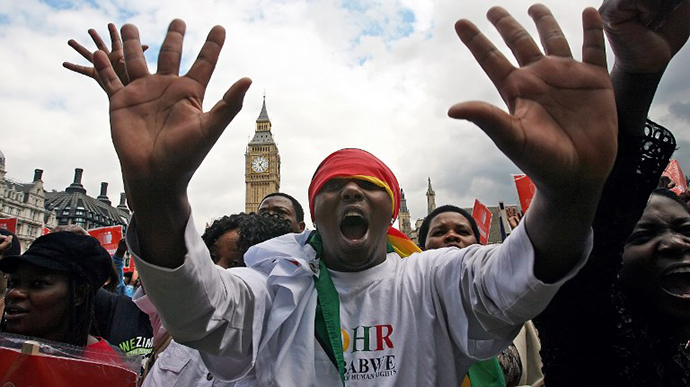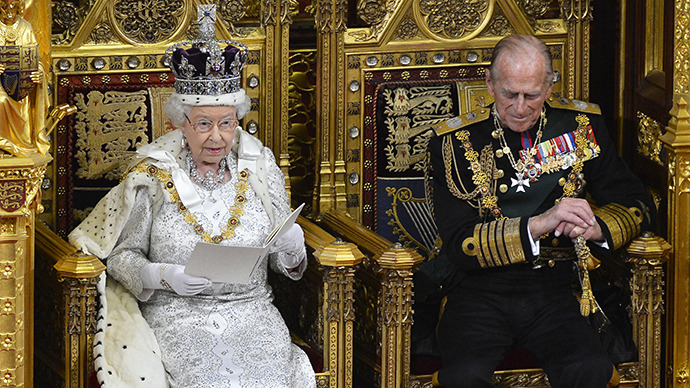In this year’s Queen’s speech, the UK government announced tougher rules on immigration in a bid to stem the flow of EU migrants to Britain.
In her annual speech to parliament, Queen Elizabeth II began by saying the government’s priority is to "strengthen Britain's economic competitiveness." She also announced a cap on social care costs and a single state pension of £144 a week, in contrast to the cuts which have dominated government policy since coming to power.
However, there was no mention of changes to Chancellor George Osborne’s controversial austerity program, despite comments on Wednesday from the Trade Union Congress (TUC) that the UK is facing a “lost decade of growth.”
The Gracious Speech – as it is also known – takes place every year in Britain, and is part of the official State Opening of Parliament. It allows the government to set out its proposed bills and the problems it wants to address for the next parliamentary session. The Prince of Wales and the Duchess of Cornwall were also present, which is seen symbolically as a sharing of the Queen’s duties now that she is growing older.
In this year’s Speech there were a number of new measures aimed at curtailing immigration to the UK, especially from poorer EU nations such as Romania and Bulgaria.
Private landlords will be required to snoop on their tenants and report those that do not possess the documents required to live in the UK. Landlords who do not will face fines running up into the thousands of pounds. The proposal has prompted criticism that ordinary people are being made to police the immigration system where the UK Border Agency (UKBA) has failed.
There will also be measures enacted to prevent illegal immigrants from obtaining driving licenses and to make it harder to access the National Health Service (NHS) for those who aren’t entitled to use it, by making EU member-states pay for their citizen’s medical treatment.
There will also be a six-month restriction to the jobseeker’s allowance, which will apply to all EU nationals who are not actively seeking employment and are unable to show they have a genuine chance of getting work.
There will also be a new residence test requiring residents to have lived in the UK for at least a year before they gain access to civil legal aid.
An immigration bill was also announced that will make it easier to deport criminal and terrorists, such as Muslim preacher Abu Hamza. Home Secretary Theresa May, who has been unable to deport Hamza despite repeated attempts, will make it impossible for such figures to use Article 8 of the Human Rights Act – the right to family life – to stay in the UK.
May believes only a full change in the law will persuade UK judges not to defer to the Human Rights Act in cases such as Hamza’s. “We want to attract people who will add to our national life, and those who do not should be deterred,” the Queen announced.

Other proposed bills include a cap in social care costs, a raise in state pensions from £107 to £144 per week, and the scrapping of means-tested top-ups.
Preliminary funding of the second stage of the HS2 high-speed rail link between Birmingham and Leeds and Manchester was also announced, allowing funding to be made available for the early design stages.
A bill to monitor mobile communications was dropped due to objections from the Liberal Democrats, the government’s coalition partners.
Plans to impose a minimum charge on alcohol and to introduce plain packaging for cigarettes were also left out, although this does not mean they will not become law at a later date.
Euroskeptics on the rise?
The new laws designed to curb immigration will be viewed by many as a reaction to the rise of UKIP and their recent successes in local elections. However, the Speech was written before polling day.
Cameron will also hope that the new tougher measures on immigration will help to quell the growing clamor in his backbenches for a referendum on EU membership in this parliament. Cameron has said this would be impossible because he has an agreement with pro-EU Liberal Democrats not to hold a referendum on the issue, although he has promised to hold one in the next parliament if the conservatives win the elections in 2015.
The Prime Minster vowed he will be able to secure real changes in Britain’s EU membership terms by negotiating with the body. “I want to give people a proper choice between Britain remaining in a reformed EU or leaving that EU,” Cameron said on Tuesday at a London conference on the future of Somalia.
The festering issue was given game-changing status by the intervention on Tuesday of 81-year old Lord Lawson, Margaret Thatcher’s longest-serving chancellor. In the Times, he urged Britain to completely quit Europe, saying it was a “bureaucratic monstrosity” which damaged the interests of the City of London.
No-growth Britannia
In a further blow to Chancellor George Osborne’s unwavering austerity program, the TUC warned the government that they are facing a “lost decade of growth,” and that the UK is lagging behind its rivals. A recent report by the International Monetary Fund (IMF) showed that Britain was experiencing a slower economic recovery than 23 of its 33 rival economies.
The TUC report comes as the IMF visit London on Wednesday for their annual report on the state of the UK economy.

